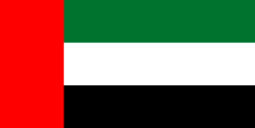Flag of Ajman
 |
|
| Use |
National flag and state ensign |
|---|---|
| Proportion | 1:2 |
| Adopted | December 2, 1971 |
| Design | A horizontal tricolour of green, white and black with 2/8s of the red on the left |
The flag of the United Arab Emirates (Arabic: علم الإمارات العربية المتحدة) contains the Pan-Arab colors red, green, white, and black, which symbolize Arabian unity. It was adopted on December 2, 1971.
Merchant ships may fly the alternative civil ensign, a red flag with the national flag in the canton.
Each of the seven emirates within the United Arab Emirates has its own flag, except for Fujairah, which uses the federal flag as state flag too.
The flags are derived from the red flags traditionally used by the different Arab emirates around the Persian Gulf. Under the protection of the British Empire from 1820, it was decided to add a white field at the hoist of the flag. The same basic pattern can be seen in the flag of Bahrain and the flag of Qatar, emirates who opted not to join the UAE when it was created in the 1970s.
The flag of Abu Dhabi is an otherwise plain-red flag with a white canton, i.e. a small white rectangle in the upper hoist of the flag.
The flags of Ajman and Dubai are identical. They are both plain red with a white bar at the hoist, i.e. closest to the flag staff.
Before 1952, the flag of Fujairah was plain red. In 1952, the emirate's name was added to the flag, and a red flag with a white border was adopted as an ensign. This continued to be the official flag until Sheikh Hamad bin Mohammed Al Sharqi abolished the red flag and adopted the Federal flag as the flag of Fujairah in 1975.
...
Wikipedia
